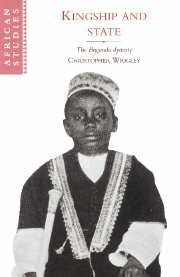Book contents
- Frontmatter
- Contents
- List of illustrations
- Preface
- Notes on language
- List of abbreviations
- 1 Preamble
- 2 The story and its making
- 3 Introduction to myth
- 4 Introduction to Buganda
- 5 The remoter past
- 6 Genesis
- 7 The cycle of the kings
- 8 Fragments of history
- 9 Foreign affairs
- 10 The making of the state
- 11 Reflections
- Notes
- Bibliography
- Index
- Other books in the series
11 - Reflections
Published online by Cambridge University Press: 12 January 2010
- Frontmatter
- Contents
- List of illustrations
- Preface
- Notes on language
- List of abbreviations
- 1 Preamble
- 2 The story and its making
- 3 Introduction to myth
- 4 Introduction to Buganda
- 5 The remoter past
- 6 Genesis
- 7 The cycle of the kings
- 8 Fragments of history
- 9 Foreign affairs
- 10 The making of the state
- 11 Reflections
- Notes
- Bibliography
- Index
- Other books in the series
Summary
Political economy
By the later eighteenth century the kingship of Buganda was evidently a prize for which ambitious men were willing to compete with desperate ferocity, staking their own lives and killing without mercy, while other men, not eligible for the supreme position, strove no less avidly for a share in the spoils of power. There was in other words a large surplus to be seized, and obvious questions follow. How did the surplus arise? How was it extracted, and from whom? And these are part of the larger questions about state formation which have been the main themes of African historical studies since their academic beginnings some forty years ago.
Structures of political authority of the kind that Europeans could recognise as states were by no means universal in sub-Saharan Africa, and where they existed they were generally smaller, weaker and less durable than those of Asia and Europe. This undeniable fact has troubled African intellectuals and foreign sympathisers, because states are commonly regarded as the proper mode of political existence and have now become the compulsory mode. Africans thus appeared to have fallen behind in the normal journey of political development, with the natural implication that they were deficient in some crucial capacity, either genetic or environmental. Colonial apologists had welcomed this inference, since government was held to be chief among the blessings conferred on Africa by European rule. Hardliners among them had seen the deficiency as incurable and the foreign rule therefore necessarily eternal. Liberals had thought it possible to implant new political organs and withdraw when they were capable of autonomous functioning.
- Type
- Chapter
- Information
- Kingship and StateThe Buganda Dynasty, pp. 230 - 252Publisher: Cambridge University PressPrint publication year: 1996
- 1
- Cited by

